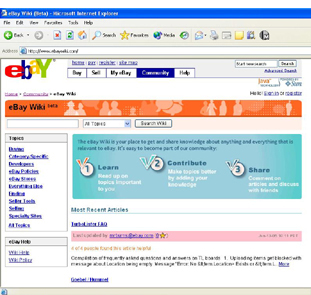New eBay Wiki aims to harvest collective knowledge of the 193 million eBay community

As part of its search for “'social shopping' dollars with Web 2.0 forays,” eBay has launched a new eBay Community Wiki to help its membership base of 193 million buyers and sellers “communicate in new ways.” In partnership with JotSpot, a Wiki application platform provider, eBay is inviting its users to “learn, contribute and share” at ebaywiki.com.
Rachel Makool, senior director of community development for eBay, said:
JotSpot’s wiki technology enables us to create a new avenue for our users to share content across a broad range of eBay specific topics…part of eBay’s continued focus on providing solutions for our community to be successful buying and selling on eBay
According to eBay, its new Community Wiki is:
a collection of fact-based articles written and maintained by eBay Community members. You can use eBay’s Wiki to read up on topics important to you or contribute by adding topics or making existing articles better…You can add an article on any topic or about any product, and you can edit the information in any other article.

The eBay Wiki, however, is but the latest way eBay users can “learn, contribute and share” at eBay. eBay offers so many eBay community communications options, in fact, that it advises: “When you have something you want to share with the eBay Community, choosing the right tool to post makes all the difference.”
eBays’ “About User-generated Content” FAQ describes a dizzying array of five different eBay venues for eBay buyer and seller contributed content:
If you want to post opinions, you should use:
Blogs: A blog (also known as a weblog) is a running commentary listed in reverse chronological order. Your blog is about you, so it’s where you can write opinions or tell your stories. Blogs certainly include factual information, but they're mostly about opinion and may include comments at the blog owner’s discretion.
Discussion Boards: Discussion boards are a great way to get involved in an ongoing dialogue with many members of the Community. Posts are mostly short opinions with the expectation that another user will respond with a post.
Reviews: Here you can post comments and ratings for specific products.
When you want to share factual information, you should use:
The eBay Wiki: Articles written for the eBay Wiki are factual and objective. Topics can range from the functionality of Turbo Lister to a biography of Meg Whitman. Features, people or processes – if it’s objective and factual, you should post a Wiki article.
Guides: eBay Guides are fact-based articles written by experts, collectors or any member with helpful, accurate information to share. Often, these are written as “how-to’s” for products or features.
eBay also warns: “It’s important not to use these opinion areas for feedback about a trading partner. Our Feedback system is designed to keep track of all comments related to transactions. Posting Feedback in other areas results in inaccurate Feedback scores.”
eBay has tried to simplify its users’ content contribution decision making process with a chart:
The challenge eBay faces in garnering, managing and controlling quality user contributed content is illustrated not only by the extensive user documentation required, but also by the somewhat sparse feel of the eBay Wiki, at launch. In contrast, eBay’s new “MyCollectibles” social sharing destination for collectable enthusiasts launched pre-populated with colorful, dynamic photos representing a variety of “Featured Collections” contributed from a number of “Featured Collectors.”
For the typical Internet user, “MyCollectibles” presents as an inviting, fun community to join, while eBay Wiki may present as a laborious undertaking.
For more on the challenges of soliciting user-contributed content online see my “Tags, diggs and comments: coaxing a 'delicious' social Web" and Dan Farber’s “Social media–the new growth hormone.”